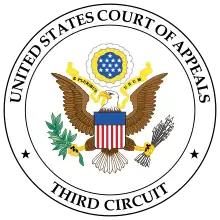Miller v. Skumanick
'Miller v. Skumanick' was a 2010 Third Circuit Court of Appeals case regarding the practice of sexting and its legal relationship to child pornography.
| Miller v. Skumanick | |
|---|---|
 | |
| Court | United States Court of Appeals for the Third Circuit |
| Full case name | Mary Jo Miller, Individually and on behalf of her minor daughtor, MM; Jami Day, Individually and on behalf of her minor daughter GK; Jane Doe, Individually and on behalf of her minor daughter, ND v. Jeff Mitchell, District Attorney of Wyoming County, Pennsylvania |
| Argued | January 15, 2010 |
| Decided | March 15, 2010 |
| Court membership | |
| Judge(s) sitting | Thomas L. Ambro, Michael Chagares, and Walter King Stapleton |
Background
In October 2008, Tunkhannock Area School District officials confiscated several students' cellphones and found photographs of three female students, two were in their underwear and one was topless. No photos were exposed below the waist and no sexual acts were portrayed. He gave those photos as to Wyoming County District Attorney George Skumanick, Jr. Skumanick promised to file charges against those posing in the photographs for production of child pornography unless they agreed to probation, completed a six to nine month educational program which would require participants to submit an essay explaining why their actions were wrong. No actions were proposed against the male students possessing and distributing the images. The three families collectively filed for a temporary restraining order in district court to prevent the prosecution from taking place while they seek an injunction. The restraining order was granted, and Skumanick appealed.
Decision
The plaintiffs argued that prosecution would amount to retaliation against their children's First Amendment right to free expression and against compelled speech, and the parents' Fourteenth Amendment substantive due process right to direct the upbringing of their children. The appellate court upheld the temporary restraining order based on the second and third claims. Specifically, the court affirmed that the students' First Amendment right against compelled speech would be violated by the program's requirement that the student involve explain why their actions were wrong, and the parents' Fourteenth Amendment rights would be violated by the program's moral nature.
The appellate court opinion in this matter did not address whether the pictures in question were pornographic in nature, as it instead ruled that there was no evidence that the plaintiffs ever possessed or distributed the photos.
